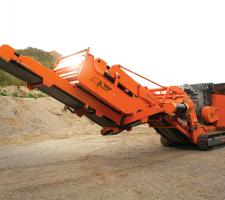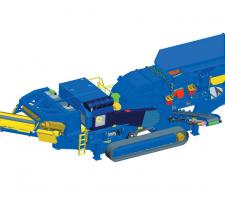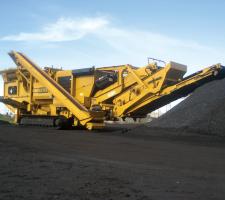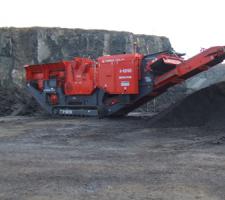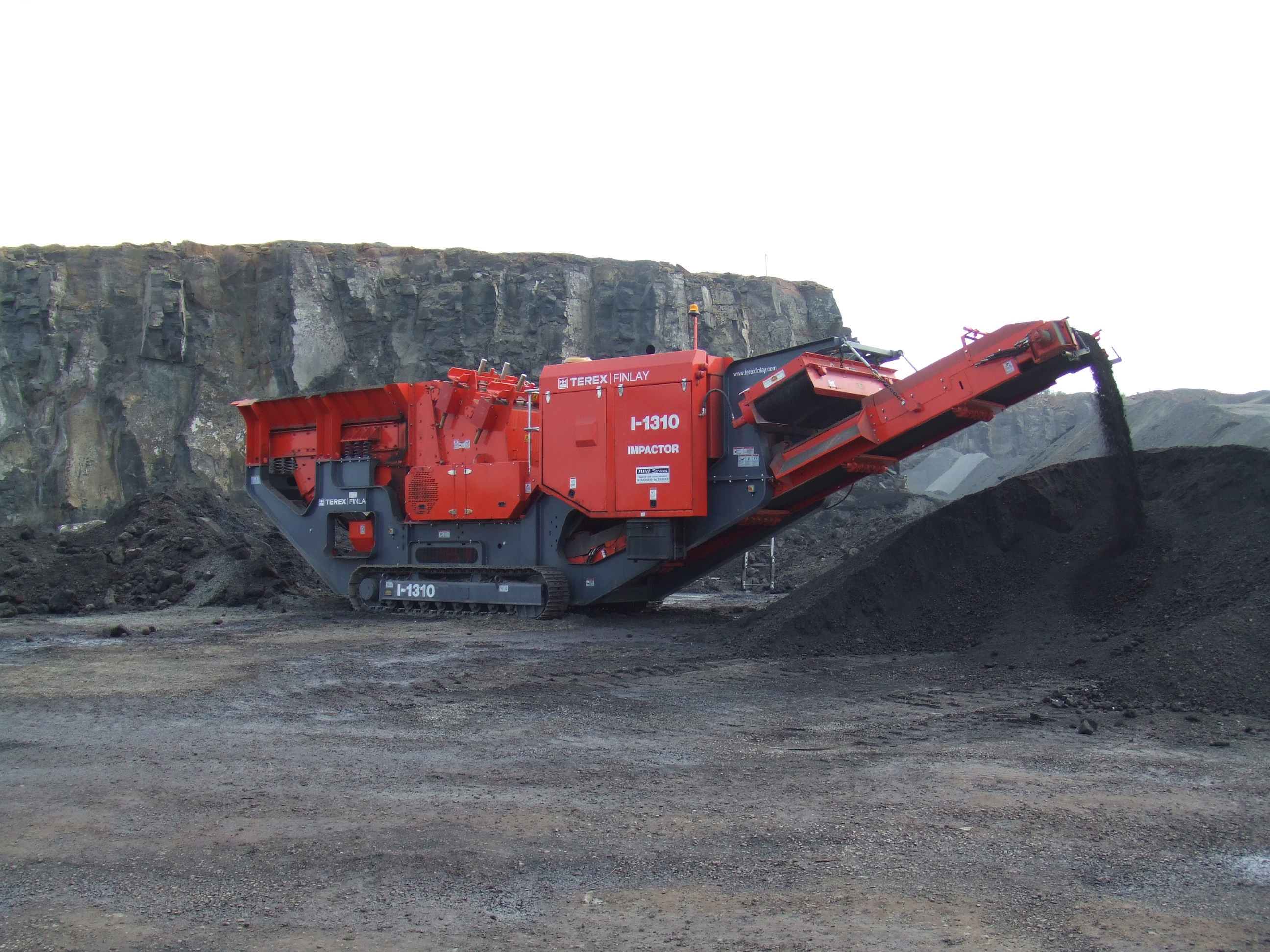
Demands for greater mobility and improved environmental performance are driving development of new crushing technology. Adrianna Potts takes a look at the latest innovations
With the present high demand for quality aggregates, customers in Europe's crushing and screening market are looking beyond the traditional requirements for crushing units. They want added value - and this doesn't just mean dealer support for machine backup and spare parts availability. Many are seeking increased productivity through the use of fully mobile tracked machines and more environmentally friendly units.
"The world is going mobile," said Fintec European sales manager Michael Brookshaw. According to Brookshaw, the main driver for the trend is the efficiency and performance they can offer. "Modern mobile plants can deliver equivalent performance in terms of capacity and product quality (product grading and shape requirements) of a medium sized fixed plant," he said.
Brookshaw is careful to point out that mobile units will not replace large fixed plants. "But large plants take time to build or can suffer a major breakdown and while the static plant is out of work a compact, mobile plant that can be set up in a short time, is invaluable."
However, Brookshaw sees no reason why a mobile unit cannot work alongside a fixed plant on a more permanent basis. "They can complement each other and we believe that a mobile crushing/screening plant will become part of a basic fleet in quarries; just like excavators, for instance," he said.
The mobility and versatility of tracked machines can certainly provide major operational benefits: they are relatively simple to transport by standard low flatbed trucks, can be quickly altered to suit the current site and are easy to operate. In essence, this reduces logistics, saves on costs and adds to quarry productivity. According to Fintec, companies that use mobile technology are usually more efficient and competitive than those that do not.
But mobile crushing equipment is not a new phenomenon - tracked units have been used in quarries for many years. There are some established manufacturers of mobile crushing plants, but more and more suppliers are including this option in their product line-up as investment in tracked crushing plant becomes an established trend in the aggregates industry.
Growing market
"There's a huge and growing demand for aggregates and manufacturers of mobile plants are actually struggling to meet the high level of orders for new equipment," said Brookshaw. "The demand for mobile crushing units is growing at a global rate of about 15% per year and this trend looks set to continue for the next five to ten years." In Europe, the growing demand for tracked crushing equipment is strongest in emerging markets. "We're seeing high levels of orders from the Eastern European markets, including Russia," said Brookshaw, adding that there are numerous construction projects going on in these countries, both in infrastructure and roads. "We reckon that this specific geographic market will grow between 30% and 50% in the next three years alone."
However, Brookshaw points out that there is still reasonably high demand from mature markets, such as in Western Europe. "Germany, for instance, is currently going through a construction boom and for the first time in the last 12 years, we've started to see demand picking up considerably there."
Lean and green
Manufacturers are also rising to the green challenge and are looking at ways of improving the environment performance of their crushing units, which is especially important if the quarry is located close to urban areas. Environmental improvement has mainly been achieved by reducing noise and minimising the spread of dust and fines by using dust suppression systems.
"With the telescopic chute we create a better working environment and reduce operational costs, clean-up costs and production losses," explained Sandvik Mining and Construction global product line manager for wear protection and screening media Johan Renmarker.
Another improvement has been achieved by equipping crushing plants with efficient power units, which reduces fuel consumption and minimises exhaust emissions.
"Manufacturers will be forced to address these environmental issues, such as fuel efficient engines and dust suppression systems, over the next few years," said Brookshaw. "But the point is to make the unit not only environmentally friendly but also user friendly and efficient. You've got to combine all these things. Mobile units are very economical and can also be environmentally friendly." Another environmental advantage of using mobile units is the ability to recycle and reclaim waste materials such as asphalt, concrete, bricks, tiles and minerals. According to Brookshaw, this gives aggregate companies additional opportunities to further improve environmental performance. "If you're building a road or motorway and you come to an area where there are no fixed crushing plants nearby, you could use the mobile plant to turn the road into a linear quarry. I mean, if you can use the material around you, provided it is the right material and it can be processed, you dig it and process it and reuse it. I know of a successful project using this approach in Algeria."
Technology development
Computer controls are also improving the efficiency of the way both mobile and fixed crushing units operate. CANBUS based electronic control technology is increasingly being used to automatically regulate the feed to the crusher based on engine load and allows the machine to be integrated into other operating systems. This allows quarry operators to ensure their equipment achieves the maximum productivity.
Sandvik's latest UH4800i Crawlmaster features the H4800 Hydrocone crusher with an ASRi crusher control system to continually monitor the crusher's load. The machine will be on display for the first time at
The need for productivity also includes reducing the potential for downtime and making maintenance easier to carry out.
An interesting development is
Fintec's new 1440 and
Other manufacturers have updated some of their established models to improve maintenance. For instance, Extec's C-10+ is an updated version of its C-10 machine. The new jaw crusher now features a Vogel greasing system. By lubricating the bearings frequently with small amounts of grease, the system ensures that the bearings are sealed from dirt and that any washed-away lubricant is quickly replaced.
Extec has also developed a recirculation system that can remove or re-circulate oversize materials. The system uses the Extec vibrating grid, offering an effective separation process and ensuring that a refined end product can be achieved.
Terex Pegson's 1000SR mobile plant also has a screening system to allow oversized particles to be automatically recirculated. The Terex unit combines double deck sizing screen and a re-circulating system all on one tracked chassis.
Kormann
Mobile revolution
The benefits of mobile crushing equipment are clear, but it is unlikely that tracked units will ever completely replace fixed units. Nonetheless, the acquisition of the German company Kleeman by the
Although Kleeman does manufacture fixed crushing plants, around 80% of its business is in the mobile sector. In 2006,
With Wirtgen's move into the crushing market to complement its existing road building strengths, will other major equipment manufacturers follow suit to become true full-liners? If Brookshaw's prediction of 15% growth over the next five to 10 years is to be believed, then there may well be some more significant acquisitions in the market to come
Shaping the future
A new road surface for the autobahns in Germany is now being manufactured with help from a Sandvik VSI crusher. This new type of road surfacing material has been designed to reduce road noise around populated areas and to improve surface water drainage.
According to Shicker Quarries, a major producer of aggregate for this type of road surface, the shape of the aggregate is key. A crusher that can consistently produce 'in-specification' cubic-shaped material is essential and the company opted for a Sandvik VSI crusher.
Shicker's VSI crusher is fitted with an 110kW motor and has a throughput of up to 120tonnes per hour. The European standard (EN13043) calls for an average 85% cubicity but Germany's specification for new noise reducing surfacing calls for 92% cubicity. However, with the Sandvik crusher, Shicker was able to achieve the critical size of 5 to 8mm with 96 to 97% cubicity. According to Sandvik, some of the larger fraction sizes even achieved 100%.
The aggregate produced by Shicker also achieves a PSV rating (Polished Stone Value) of 55 and is bound using a polymer modified bitumen binder. According to Shicker, the high cubicity of the aggregate produced by the Sandvik VSI crusher means less bitumen is required to coat the stone.
The finished asphalt reduces noise by an average of 5dB(A) and with the new type of polymer bitumen combined with the shape of the aggregate, better water drainage is achieved, making the road surface safer in wet conditions.


